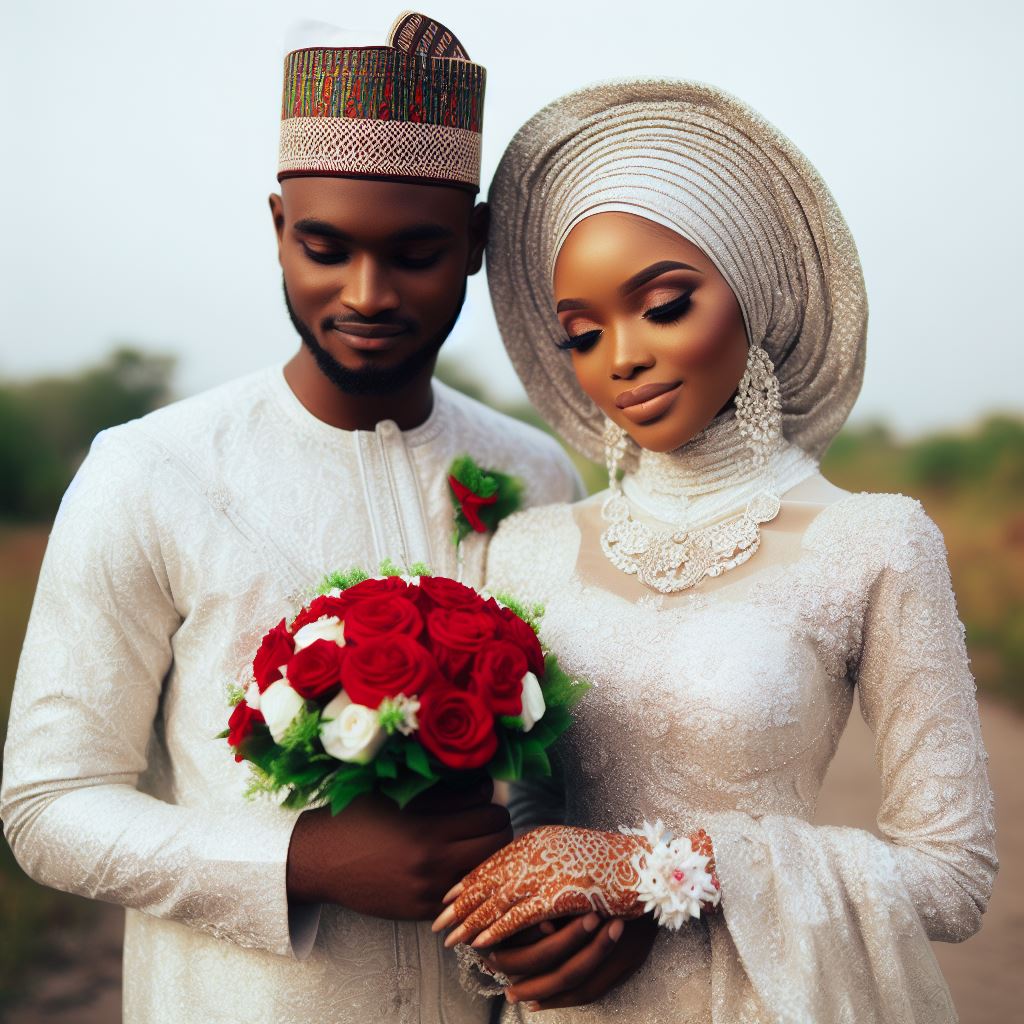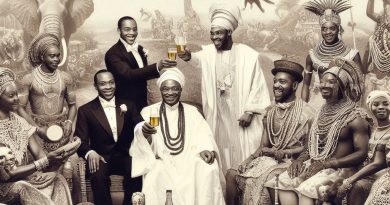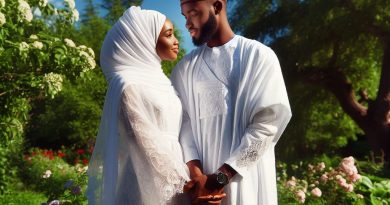How to Prepare for a Halal Muslim Wedding in Nigeria
Last Updated on October 13, 2023
Introduction
A Halal Muslim wedding is a significant event in Nigerian culture, demonstrating the commitment between two individuals.
Proper preparation is crucial for a successful celebration.
In a Halal Muslim wedding, the couple enters into a sacred union according to Islamic principles.
Preparation is essential to ensure adherence to Halal practices and to create a memorable experience.
Firstly, it is important to engage with the couple to understand their desires and expectations for the wedding day.
Next, a suitable venue needs to be chosen, considering the capacity, comfort, and accessibility for guests.
Arranging for a reputable Muslim cleric to officiate the ceremony is crucial for a Halal Muslim wedding.
Food plays a vital role in the celebration, so it is important to find a Halal-certified caterer that can provide delicious and permissible meals.
Decoration should reflect the couple’s style and incorporate traditional elements like floral arrangements and Islamic motifs.
To involve the community, invitations must be sent out well in advance, indicating the wedding date, time, and venue.
Ensuring separate prayer areas for men and women is essential during the ceremony.
Photography and videography services should be arranged to capture cherished moments throughout the event.
Lastly, proper coordination of all elements, from the bridal party’s attire to transportation, ensures a smooth and enjoyable wedding day.
Basically, a Halal Muslim wedding is a significant event in Nigerian culture.
Adequate preparation is crucial to uphold Halal practices and create a memorable celebration for the couple and their loved ones.
Understanding the Requirements
When it comes to a Halal Muslim wedding in Nigeria, there are certain essential elements that must be considered.
These elements ensure the marriage is conducted in accordance with Islamic principles and local customs.
Understanding and fulfilling these requirements is of great significance for a successful and meaningful wedding ceremony.
The presence of witnesses and consent of both parties
In a Halal Muslim wedding in Nigeria, the presence of witnesses is crucial.
According to Islamic tradition, at least two trustworthy witnesses must be present during the marriage ceremony.
These witnesses are responsible for observing the exchange of vows and documenting the consent of both the bride and groom.
Their presence ensures the marriage is genuine and recognized by the Muslim community.
The role of the Imam or religious officiant
The Imam or religious officiant holds a significant role in a Halal Muslim wedding in Nigeria.
They are responsible for leading the marriage ceremony and ensuring it follows Islamic guidelines.
The Imam recites verses from the Quran, offers prayers, and delivers a sermon that emphasizes the importance of marriage in Islam.
Their presence not only provides religious authenticity to the wedding but also imparts valuable guidance to the couple.
The adherence to cultural norms and traditions
A Halal Muslim wedding in Nigeria is not just a religious event, but also a celebration of cultural customs and traditions.
These may vary among different regions and ethnic groups in Nigeria, but they are all important in creating a festive and joyful atmosphere.
Traditional Nigerian attire, music, dance, and food play a significant role in these weddings, reflecting the rich cultural heritage of the nation.
Adhering to these customs and traditions ensures the wedding is a memorable and cherished event for both the couple and their families.
Understanding and fulfilling the requirements of a Halal Muslim wedding in Nigeria is crucial for several reasons.
Ensures that the marriage is conducted in accordance with Islamic principles
First and foremost, it ensures that the marriage is conducted in accordance with Islamic principles, which is of utmost importance for practicing Muslims.
It upholds the sanctity of the union and ensures that it is recognized and respected within the Muslim community.
Helps to build a strong foundation for the couple’s married life
Additionally, fulfilling these requirements helps to build a strong foundation for the couple’s married life.
By involving witnesses and obtaining the consent of both parties, the couple acknowledges the importance of trust, transparency, and mutual agreement in their relationship.
This sets the tone for a harmonious and respectful marriage.
The involvement of an Imam or religious officiant not only adds religious authenticity but also provides spiritual guidance.
The Imam’s presence reminds the couple of the spiritual significance of their union and helps them cultivate a deep understanding of their religious obligations as spouses.
Pay homage to their heritage and strengthens family bonds
By adhering to cultural norms and traditions, the couple pays homage to their heritage and strengthens family bonds.
It fosters a sense of unity and brings together relatives and friends to celebrate this joyous occasion.
Embracing these customs also allows the couple to appreciate the beauty and diversity of Nigerian culture.
Generally, a Halal Muslim wedding in Nigeria requires the presence of witnesses, the consent of both parties, the involvement of an Imam or religious officiant, and adherence to cultural norms and traditions.
Fulfilling these requirements ensures a meaningful and memorable wedding ceremony that is in line with Islamic principles and local customs.
It sets the stage for a successful and blessed marriage, both spiritually and culturally.
Read: Sustaining Love: Key Prayers for Long-lasting Nigerian Marriages
Finding the Right Venue
When planning a halal Muslim wedding in Nigeria, one of the most important tasks is to find a suitable venue that adheres to Islamic principles.
Here are some tips to help you find a halal-friendly venue:
- Research Mosques, Islamic Centers, or Specialized Wedding Venues: Look for venues that are specifically designed for Islamic weddings. Mosques and Islamic centers often have designated spaces for wedding ceremonies.
- Consider the Capacity, Facilities, and Ambiance of the Venue: Determine the number of guests you expect and ensure the venue can accommodate them comfortably. Check if the venue provides separate spaces for men and women to maintain modesty.
- Verify Its Reputation and Reviews: Just like any other event, it is crucial to know the reputation of the venue. Read reviews from previous clients to get an idea of their experience and how well the venue adheres to halal practices.
Finding the right venue is vital as it sets the tone for your halal Muslim wedding and ensures that all Islamic principles and traditions are upheld.
A suitable venue will provide an environment that aligns with your religious beliefs and values.
Read: Marriage Challenges? Here’s a Prayer Guide for Nigerian Couples
Planning the Guest List
Creating a thoughtful guest list for a Halal Muslim wedding is key to ensuring a memorable and inclusive celebration.
Insights on how to create a thoughtful guest list for a Halal Muslim wedding
Here are some insights and suggestions to help you with this important task.
First and foremost, it is crucial to include close family members and friends in the guest list.
These are the people who have been there for the couple throughout their lives and who will continue to support them in their marital journey.
Including them not only shows appreciation but also strengthens the bond between families.
In addition to immediate family members and close friends, there are cultural expectations around inviting extended family and acquaintances.
In Nigerian Muslim weddings, it is customary to extend invitations to a wide range of relatives and connections.
This is seen as a way to honor the community and celebrate the joyous event with everyone.
However, managing the guest list can be a challenging task, considering the limited capacity of the wedding venue and the budget constraints.
Suggestions on managing the guest list to ensure an inclusive celebration
To ensure an inclusive celebration, here are some suggestions:
- Prioritize: Begin by identifying the must-have guests, such as immediate family members and close friends. Make a list of the essential individuals who should be present on this special day.
- Categorize: Divide the guest list into different categories, such as family, friends, colleagues, and acquaintances. This will help in understanding the size and composition of each group, making it easier to allocate invitations accordingly.
- Set Limits: Determine the maximum number of guests you can accommodate within your budget and the venue’s capacity. Be realistic about the limitations and make tough decisions if necessary.
- Consider Plus Ones: Discuss with the couple if they are open to allowing their guests to bring plus ones. It is important to consider spouses, life partners, or close friends who may not want to attend without their significant others.
- Communicate Clearly: When sending out invitations, clearly state whether or not the guests may bring additional people. This will avoid any confusion or misunderstandings.
- Keep a Backup List: In case some of the invited guests are unable to attend, it is useful to have a backup list of individuals who can be invited at a later stage. This ensures that no spaces are left unfilled, and it allows for a more inclusive atmosphere.
- Follow-Up: It is essential to follow up with invited guests as the RSVP deadline approaches. This helps in getting an accurate headcount and allows for adjustments to be made if needed.
Remember, the guest list plays a significant role in setting the tone and atmosphere of a wedding.
By thoughtfully considering who to invite and managing the list effectively, you can ensure that your Halal Muslim wedding in Nigeria is a joyous and inclusive celebration for all.
Read: Prayers for Every Season of Your Nigerian Marriage Journey
Arranging the Traditional Wedding Attire
In Nigeria, traditional wedding attire holds immense cultural significance.
It’s a symbol of heritage and identity, reflecting the diversity of the country’s many ethnic groups.
For the Bride
- Iro and Buba: A popular choice, featuring a flowing blouse and wrap skirt, often adorned with intricate beadwork.
- Hausa Brides: Opt for a stunning Zari (silk) dress with a matching headscarf and abundant jewelry.
- Yoruba Brides: Consider the elegant Aso-Oke fabric for a regal look, paired with elaborate gele (headgear).
For the Groom
- Agbada: A flowing robe with embroidery, a cap, and traditional shoes – an attire of grandeur.
- Hausa Grooms: Adorn the rich Babban Riga, typically embroidered with lavish designs.
- Yoruba Grooms: Opt for the classic agbada or a modern, tailored suit paired with a fila (cap).
Selecting Attire
- Prioritize modesty to adhere to Islamic customs.
- Consult with your elders or a traditional attire expert for authenticity.
- Ensure you respect cultural and religious modesty requirements in your attire.
Arranging Attire
- Plan ahead to allow time for customization.
- Seek a skilled tailor or designer for the perfect fit.
- Coordinate attire with the wedding theme for a harmonious look.
Essentially, Nigerian traditional wedding attire is a rich tapestry of culture and history.
By choosing and arranging it with care, you honor both your heritage and your faith, creating a meaningful start to your Halal Muslim wedding.
Read: Intimacy Beyond Words: Incorporating Prayer in Marital Life

Hiring the Right Vendors
Planning a Halal Muslim wedding in Nigeria requires careful consideration and attention to detail.
Importance of selecting vendors that understand and respect Halal Muslim wedding customs
One of the most crucial aspects of organizing a successful Halal Muslim wedding is selecting vendors who understand and respect the customs associated with this type of celebration.
List of essential vendors for a Halal Muslim wedding in Nigeria
Here are some tips on hiring the right vendors.
Caterers who can provide halal meals
It is essential to find caterers who specialize in halal cuisine, ensuring that all the food served at the wedding adheres to Islamic dietary laws.
Look for caterers who have experience in preparing halal meals and can accommodate any specific dietary needs.
Photographers who understand cultural sensitivities
When hiring a photographer for a Halal Muslim wedding in Nigeria, it is crucial to find someone who is familiar with and sensitive to Islamic customs and traditions.
They should know the appropriate way to capture moments without compromising the privacy and modesty of the couple and their guests.
Decorators who can create a respectful and culturally appropriate ambiance
In Nigerian Halal Muslim weddings, the ambiance and decor play a significant role in setting the tone and creating a welcoming atmosphere.
It is important to hire decorators who are knowledgeable about Islamic art and design, and who can create an environment that respects the cultural and religious sensitivities of the couple and their families.
Tips on finding and hiring reliable vendors
When searching for reliable vendors, keep the following tips in mind:
- Do thorough research: Look for vendors who have experience working with Halal Muslim weddings in Nigeria. Check their websites, portfolios, and social media profiles to see if they have a good understanding of Islamic customs and traditions.
- Read reviews and testimonials: Look for feedback from previous clients to get an idea of the vendor’s professionalism, reliability, and how well they understood and respected the cultural aspects of the wedding.
- Ask for recommendations: Reach out to friends, family, and members of the Muslim community who have organized Halal Muslim weddings in Nigeria. They can provide valuable insights and recommend vendors who they had a positive experience with.
- Interview potential vendors: Once you have shortlisted a few vendors, schedule meetings or phone calls to discuss your requirements and expectations. Ask them about their experience with Halal Muslim weddings and how they plan to incorporate cultural customs into their services.
- Check for proper licenses and certifications: Ensure that the vendors you hire have the necessary licenses, permits, and certifications required to provide their services. This will give you peace of mind knowing that they meet industry standards and regulations.
In general, selecting the right vendors for a Halal Muslim wedding in Nigeria is crucial to ensure a successful and culturally appropriate celebration.
It is essential to find caterers who can provide halal meals, photographers who understand cultural sensitivities, and decorators who can create a respectful ambiance.
Following these tips will help you find reliable vendors who can bring your vision to life while respecting Islamic customs and traditions.
Planning the Wedding Program and Activities
When preparing for a Halal Muslim wedding in Nigeria, it is important to create a wedding program that aligns with Islamic customs.
Here are some guidelines to help you plan the perfect wedding program:
1. Understand Islamic Customs
Before you start planning your wedding program, take the time to understand Islamic customs and traditions.
This will help you ensure that your program is respectful and aligns with the religious values of the couple.
2. Include Essential Elements
A traditional Halal Muslim wedding program includes essential elements such as the recitation of the Quran, the exchange of vows, and the signing of the wedding contract (Nikah).
Make sure these elements are included in your program.
3. Incorporate Traditional Activities and Rituals
In Halal Muslim weddings in Nigeria, there are many traditional activities and rituals that are commonly incorporated.
Some of these include the Henna ceremony, the Walima (wedding feast), and the Dua (prayer) for the couple.
Consider including these rituals in your program.
4. Offer Suggestions for Personalization
While it is important to incorporate traditional activities, it is also essential to ensure a personal touch.
Offer suggestions to the couple on how they can personalize the program and make it unique to their relationship and cultural preferences.
5. Involve Family and Friends
Halal Muslim weddings are a joyous celebration that involve family and friends.
Encourage the couple to involve their loved ones in the wedding program by assigning them roles such as reciting verses from the Quran or giving speeches.
6. Consider Cultural Practices
Incorporating cultural practices is a great way to celebrate the couple’s heritage.
Discuss with the couple their cultural background and suggest ways to infuse their traditions into the program, such as traditional dances or attire.
7. Provide a Detailed Timeline
Creating a timeline for the wedding program is vital to ensure a smooth flow of events.
Include specific timings for each activity and communicate it to everyone involved, including the couple, family members, and vendors.
8. Plan for Musical Entertainment
While music is not a strict requirement in a Halal Muslim wedding, many couples choose to include it for entertainment purposes.
Plan for appropriate music that does not violate Islamic guidelines and ensures a pleasant atmosphere.
9. Decorations and Ambiance
Discuss with the couple their preferences for wedding decorations.
Emphasize the importance of creating an elegant and Islamic atmosphere that aligns with their cultural practices, such as using traditional fabrics or incorporating Islamic calligraphy in the decor.
10. Consult with an Islamic Scholar
To ensure that the wedding program adheres to Islamic customs, it is advisable to consult with an Islamic scholar.
They can provide guidance and answer any questions or concerns you may have regarding the program.
By following these guidelines, you can create a wedding program that not only aligns with Islamic customs but also includes traditional activities and cultural practices, ensuring a memorable and joyous Halal Muslim wedding in Nigeria.
Conclusion
Preparing for a Halal Muslim wedding in Nigeria requires careful planning and attention to detail.
It is important to prioritize the religious and cultural aspects of the event while also considering personal preferences.
By starting the planning process early and seeking guidance from elders and professionals, couples can ensure a smooth and meaningful celebration.
The importance of preparation cannot be overstated.
It is crucial to understand the religious and cultural requirements of a Halal Muslim wedding to ensure that all aspects of the event align with Islamic teachings.
This includes selecting a suitable venue, arranging for appropriate food and beverages, and adhering to modesty guidelines.
Starting the planning process early is key.
From securing the necessary legal documents to choosing the right vendors, it is important to give yourself ample time to make informed decisions.
Seeking guidance from elders and professionals who have experience with Halal Muslim weddings can provide valuable insights and advice.
While honoring cultural traditions is important, it is also essential to balance them with personal preferences.
Couples should feel empowered to incorporate elements that reflect their own unique style and personality.
This could include aspects such as the bridal attire, decor, and entertainment choices.
In a nutshell, a Halal Muslim wedding in Nigeria is a joyous and sacred occasion that requires thoughtful preparation.
By prioritizing religious and cultural requirements, starting the planning process early, and finding a balance between traditions and personal preferences, couples can create a meaningful celebration that will be remembered for a lifetime.


